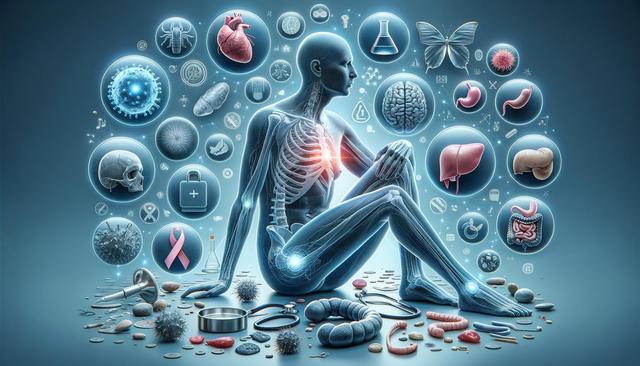Understanding the Importance of Early Detection
Early detection of cancer can significantly affect outcomes, leading to more effective treatment and improved survival rates. While some signs may seem minor or unrelated, recognizing them early helps in identifying developing conditions before they become severe. Cancer often begins silently, and by the time it becomes symptomatic, it may have already progressed. This is why being aware of early cancer signs is crucial. Many cancers, including breast, skin, lung, and colon cancer, present subtle symptoms that can be easily overlooked.
By paying attention to your body and recognizing unusual changes, you increase the chances of catching cancer in its initial stages. Advances in cancer detection methods have also made it easier to spot the disease earlier. Techniques like imaging scans, blood tests, and biopsies are commonly used in high-demand cancer detection strategies. Being proactive about regular screenings and doctor visits is a key step in prevention and early diagnosis.
Common Symptoms That Shouldn’t Be Ignored
Certain symptoms, although common, can be early indicators of cancer when they persist or worsen over time. Being aware of these can lead to earlier evaluation and diagnosis. Some of the most reported early cancer signs include:
- Unexplained weight loss
- Persistent fatigue that doesn’t improve with rest
- Changes in skin appearance, including new moles or changes in existing ones
- Unusual lumps or swelling in any part of the body
- Persistent cough or hoarseness
- Changes in bowel or bladder habits
While many of these symptoms can be linked to non-cancerous conditions, they should not be dismissed, especially if they continue for several weeks. The key is to observe whether these signs are ongoing or progressively getting worse. For instance, a chronic cough that lasts longer than three weeks or a mole that changes shape or color should prompt a medical evaluation.
Top Warning Signs Based on Cancer Types
Different types of cancer often come with their own set of early warning signs. Understanding these can help guide individuals to seek appropriate care. For example:
- Breast cancer: Lumps in the breast, nipple discharge, or changes in breast shape
- Colorectal cancer: Blood in stool, persistent abdominal discomfort, or changes in bowel habits
- Lung cancer: Chronic cough, chest pain, or shortness of breath
- Skin cancer: New growths, sores that don’t heal, or changes in existing moles
These symptoms often develop gradually, which is why they’re sometimes mistaken for less serious issues. If any of these signs appear and persist, it is important to consult a healthcare provider. Early cancer signs may not always be painful or obvious, which adds to the importance of routine check-ups and staying informed about changes in your body.
High-Demand Cancer Detection Methods
Modern medical advancements have introduced a variety of tools aimed at detecting cancer early. These high-demand cancer detection methods are increasingly accessible and effective. Among the most common are:
- Screening tests: Mammograms, colonoscopies, and Pap smears help identify cancer before symptoms appear
- Imaging technologies: CT scans, MRIs, and ultrasounds provide detailed views of internal organs and tissues
- Blood tests: Certain markers in the blood can suggest the presence of cancer
- Biopsies: A sample of tissue examined under a microscope can confirm a diagnosis
These methods are routinely used in medical facilities and are essential in identifying cancer at an early stage. For individuals with a family history of cancer or other risk factors, regular screening is even more critical. Discussing your personal risk profile with a healthcare provider can help determine the most appropriate detection approach for you.
When to Seek Medical Attention
Knowing when to see a doctor can make a significant difference in the outcome of a potential cancer diagnosis. Any persistent or unexplained symptom should be evaluated, especially if it interferes with daily activities or worsens over time. Warning signs like ongoing pain, unusual bleeding, or visible changes in the skin are signals that something may be wrong.
Here are some instances when it’s essential to seek medical advice:
- Symptoms last longer than a few weeks without improvement
- You notice a new or changing lump anywhere on your body
- There are changes in appetite, energy levels, or weight
- You experience recurring infections or fevers without a clear cause
Early cancer signs are not always obvious, and they may mimic other conditions. That’s why it’s important not to self-diagnose or delay seeking help. Timely evaluation allows for faster detection and, if needed, quicker initiation of treatment. Staying informed and proactive is a critical part of maintaining long-term health.
Conclusion: Stay Alert, Stay Informed
Recognizing early cancer signs and acting on them can lead to earlier diagnoses and better treatment outcomes. While not all symptoms point to cancer, being educated about what to look for increases the chance of catching the disease before it advances. High-demand cancer detection methods continue to improve, making it easier to identify potential issues early on. Regular screenings, paying attention to changes in your body, and consulting healthcare professionals when concerns arise are essential steps toward proactive health management. Staying informed empowers you to take control of your health and well-being.


